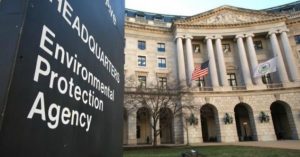
Revisions to Rules for Power Plants Ignore Science and Public Health to Boost Coal Industry Profits
Washington, D.C. – The Trump Administration Environmental Protection Agency today weakened the regulations that limit toxic water pollution from coal-fired power plants, the largest industrial source of toxic water pollution in the U.S.
EPA Administrator Andrew Wheeler, a former coal industry lobbyist, signed a final rule today to replace a 2015 rule known as the Effluent Limitations Guidelines (or “ELG Rule”) for the steam electric (coal) industry.
“Today Andrew Wheeler signed a final rule that will allow coal-fired power plants to continue discharging toxic wastewater into the nation’s rivers and streams, contaminating the drinking water and fisheries of 2.7 million people,” said Dr. Elizabeth Southerland, former director of science and technology in EPA’s Office of Water.
The revised regulation weakens pollution limits, extends compliance deadlines, and exempts many coal-fired power plants, allowing them to discharge high amounts of mercury, selenium and other toxic chemicals.
“If EPA were following the law, the coal industry would be close to eliminating its toxic wastewater by now,” said Abel Russ, Senior Attorney for the Environmental Integrity Project. “Sadly, EPA is ignoring the Clean Water Act, ignoring the courts, ignoring science, and ignoring public health. The agency is focused on just one thing: helping Trump prop up the coal industry. As a result, Americans will be forced to swallow hundreds of millions of pounds of toxic water pollution that the industry continues to dump into our waterways every year.”
For a copy of the final rule, click here.
Coal fired power plants discharge over 1 billion pounds of pollutants every year, impacting thousands of miles of rivers and contaminating the drinking water and fisheries of 2.7 million people.
After lawsuits from the Environmental Integrity Project, Earthjustice and other allies, EPA in 2015 imposed a regulation that, for the first time, required coal plants to treat the toxic wastewater generated when air pollution “scrubbers” are cleaned. The 2015 rule also required the toxic ash from burning coal to be disposed of in dry form, eliminating water pollution from ash handling.
The rule went into effect on January 4, 2016, and the water pollution controls originally had to be installed by most power plants between 2018 and 2023. In 2017, the Trump Administration postponed compliance deadlines until EPA could formally weaken the rules.
The new rule weakens water pollution controls in several ways:
- The Trump regulation requires less effective treatment of wastewater than the 2015 rule, which will result in increased discharges of selenium and other pollutants.
- The rule gives the industry an extra two years to comply.
- The rule exempts many coal-fired power plants from the already-weakened requirements, allowing them to discharge high levels of mercury, selenium and other toxic chemicals.
It is also worth noting what the rule does not do. In April of this year, the Fifth Circuit Court of Appeals vacated parts of the Obama Administration EPA’s 2015 ELG rule – limits on two waste streams from coal plants known as leachate and ‘legacy waste’ (wastewater generated before new limits kick in later this decade) – because they were not strong enough. EPA has so far failed to respond to that court ruling, prioritizing giveaways to industry over its legal obligations.
Moreover, the rule does not follow the Clean Water Act. The Clean Water Act requires EPA to impose the “best available technology” on the industry to further the goal of eliminating water pollution. If the best technology available to the industry can eliminate water pollution, EPA must require the use of that technology. In this case, EPA’s rulemaking record does in fact show that the industry could eliminate water pollution from ash handling and from air pollution scrubbers using available, affordable technology.
“EPA is legally obligated to make sure the industry keeps up with pollution control technology,” says Russ. “This rule does exactly the opposite – it allows the industry to skate by with outdated, ineffective pollution controls. This is a gift to the coal industry, plain and simple.”
The Environmental Integrity Project is an 18-year-old nonprofit organization dedicated to enforcing environmental laws and strengthening policy to protect public health and the environment.
Media contact: Abel Russ, Environmental Integrity Project (802) 482-5379 or aruss@environmentalintegrity.org


